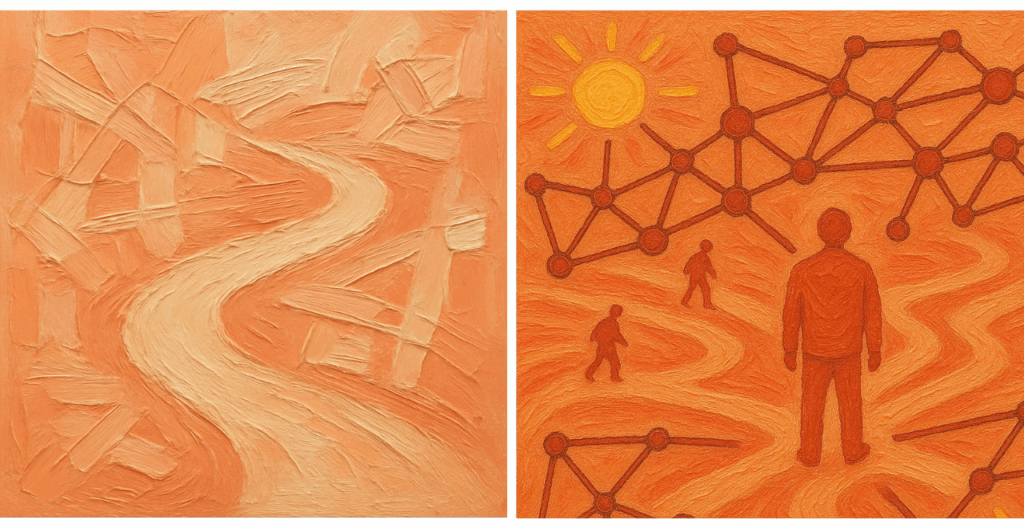
We tend to think of leadership as knowing the way forward: set a destination, make a plan, and stick to it. And many leaders still try to run organizations as if certainty were possible, by setting a goal and pushing forward.
But real life rarely allows for such straight lines.
Think about how airplanes actually fly. They don’t take off with perfect instructions for the entire flight. Instead, they adjust constantly, making tiny course corrections guided by shifting winds, changing conditions, and unexpected turbulence.
Leadership works the same way, and the leaders who thrive aren’t the ones with the most precise plans, but the ones who treat every step as an experiment.
How leaders respond to uncertainty
When faced with uncertainty, the brain has two main modes of response: anxiety or curiosity.
Anxiety-driven leadership interprets uncertainty as a threat. This activates the amygdala, narrowing attention, and triggering our fight-or-flight response. Leaders in this mode often double down on control, adding layers of planning or rigidity to create the illusion of certainty.
Curiosity-driven leadership interprets uncertainty as an opportunity. Instead of threat detection, it engages the brain’s reward system and prefrontal cortex, opening the door to exploration, creativity, and learning. Leaders in this mode experiment and explore, which leads to better long-term decisions even if the path forward is unclear.
The difference between these two modes is not about optimism versus pessimism. It’s about whether uncertainty contracts our thinking or expands it, and experimental leaders have learned to cultivate practices that make curiosity their default response.
And the choice between anxiety and curiosity might sound simple in theory, but in practice it’s anything but. Uncertainty shows up in deadlines, in strategic conundrums, in conversations with colleagues. In those moments, good intentions aren’t enough. You need practical ways to respond differently.
The Six Skills of an Experimental Leader
What separates experimental leaders is not that they feel less uncertainty, but that they’ve built specific skills for working with it. These six skills translate the idea of leading with curiosity into everyday practice. They give leaders a systematic way to stay curious, experiment, adapt, and help others do the same.
1. Think like a scientist. Experimental leaders don’t try to prove themselves right. They frame ideas as hypotheses, test them through small experiments, and treat the results as data. This mindset shifts the focus from defending assumptions to learning quickly.
2. Lead with curiosity. When things are unclear, leaders can either rush to control or pause to explore. Leading with curiosity means choosing the second path: asking better questions, seeking perspectives, and inviting others to navigate the unknown together.
3. Collaborate with uncertainty. No plan survives contact with reality. Experimental leaders see their work as a series of tiny experiments. This way, progress comes from learning from real experience rather than chasing an artificial plan.
4. Broaden the decision frame. Decisions made under pressure often default to avoidance or control. Making better decisions requires slowing down enough to consider both external signals and internal ones – not to make the “perfect” decision but the one that best supports learning.
5. Work sustainably. This means pacing yourself, protecting your attention, and managing your most precious resources (physical, cognitive, and emotional) so you and your team can keep experimenting without burning out.
6. Unlock social flow. The best leaders allow their teams to enter states of shared focus and momentum, where collaboration feels seamless. They unlock this by building psychological safety and creating rituals that encourage experimenting and learning together.
Leaders who practice these skills adapt faster because they learn from many tiny experiments instead of staking everything on one big assumption. And they create cultures of trust, creativity, and mindful productivity by making curiosity safe and expected.
Tiny Experiment of the Week
Ready to put those ideas into practice? This week’s tiny experiment will help you practice experimental leadership:
I will [ask one open-ended question in every meeting] for [one week]
This experiment will shift your default from control to curiosity and helps surface ideas you might have missed. Want to dig deeper? Get your copy of Tiny Experiments.
Until next week, stay curious!
Anne-Laure.
P.S. Boring update: we are switching our payment provider from Memberful to Circle as of September 17th! If you’re a member of the community, you should have received an email from mail@posts.memberful.com with the subject line “We’re simplifying Ness Labs!” with all the informations to securely transfer your payment details and keep your account.
